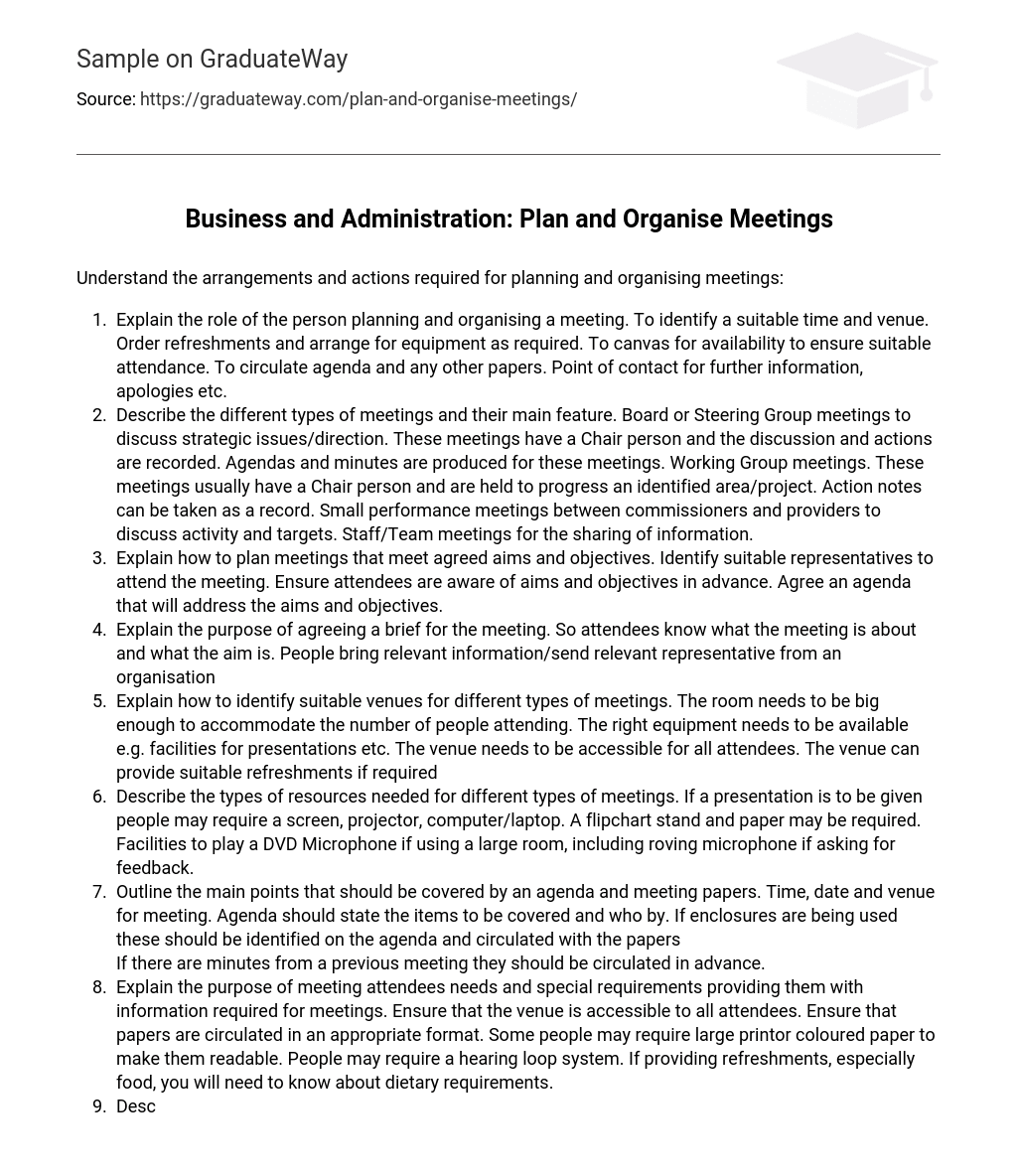Comprehend the necessary steps and activities involved in the planning and organization of meetings:
- Explain the role of the person planning and organising a meeting. To identify a suitable time and venue. Order refreshments and arrange for equipment as required. To canvas for availability to ensure suitable attendance. To circulate agenda and any other papers. Point of contact for further information, apologies etc.
- Describe the different types of meetings and their main feature. Board or Steering Group meetings to discuss strategic issues/direction. These meetings have a Chair person and the discussion and actions are recorded. Agendas and minutes are produced for these meetings. Working Group meetings. These meetings usually have a Chair person and are held to progress an identified area/project. Action notes can be taken as a record. Small performance meetings between commissioners and providers to discuss activity and targets. Staff/Team meetings for the sharing of information.
- Explain how to plan meetings that meet agreed aims and objectives. Identify suitable representatives to attend the meeting. Ensure attendees are aware of aims and objectives in advance. Agree an agenda that will address the aims and objectives.
- Explain the purpose of agreeing a brief for the meeting. So attendees know what the meeting is about and what the aim is. People bring relevant information/send relevant representative from an organisation
- Explain how to identify suitable venues for different types of meetings. The room needs to be big enough to accommodate the number of people attending. The right equipment needs to be available e.g. facilities for presentations etc. The venue needs to be accessible for all attendees. The venue can provide suitable refreshments if required
- Describe the types of resources needed for different types of meetings. If a presentation is to be given people may require a screen, projector, computer/laptop. A flipchart stand and paper may be required. Facilities to play a DVD Microphone if using a large room, including roving microphone if asking for feedback.
-
Outline the main points that should be covered by an agenda and meeting papers. Time, date and venue for meeting. Agenda should state the items to be covered and who by. If enclosures are being used these should be identified on the agenda and circulated with the papers
If there are minutes from a previous meeting they should be circulated in advance. - Explain the purpose of meeting attendees needs and special requirements providing them with information required for meetings. Ensure that the venue is accessible to all attendees. Ensure that papers are circulated in an appropriate format. Some people may require large printor coloured paper to make them readable. People may require a hearing loop system. If providing refreshments, especially food, you will need to know about dietary requirements.
- Describe the health, safety and security requirements that need to be considered when organising meetings. The venue should meet health and safety requirements e.g. no trailing wires, fire exits etc. Make housekeeping clear. Where the toilets, fire exits are, whether there is a fire alarm test due etc. Is there restricted access to any part of the venue? Does this impact on accessing the meeting area. People need to sign into building as required for fire register
- Explain the purpose and benefits of briefing the chair before a meeting. To ensure that they are clear on the aims and objectives of the meeting. Aware of who is attending, doing presentations etc.
- Explain the purpose of welcoming and providing suitable refreshments to attendees if required. Everyone should be welcomed at the beginning of a meeting and introductions made if people are not familiar with everyone in the room. This ensures that everyone knows who each other are and where they are from. Refreshments may be provided if appropriate especially if there are external attendees who have had to travel and have no access to drinks etc. Lunch can be provided if the meeting covers this time.
- Describe the types of information, advice and support that may need to be provided during a meeting. Appropriate papers for the meeting. A Chair to lead the meeting. A dedicated person to record minute/action notes if required. Ensure everyone is aware of the location of toilets and any other facilities.
- Describe the types of problems that may occur during a meeting and how to solve them. People arriving late – ask people to take a seat and introduce them at a convenient point. Equipment failure – check equipment working prior to the commencement of the meeting, have a back up plan.. If someone wants to speak and is not acknowledged by the Chair try and attract the Chair’s attention discreetly.
- Explain what should be included in a record of a meeting and the purpose of ensuring the record is accurate and approved. Name of attendees and organisation representing. Discussion/actions agreed as appropriate. Date of next meeting. The minutes of a meeting will be seen as a record of what happened and can be referred to by people not at the meeting and at any time in the future. Therefore it is important that they are accurate.
-
Explain how to record actions and follow up if required Actions are noted within the minutes and a name/s of who is responsible for
these. It is important to record the outcome of these actions for future reference. It may be necessary to remind people that they have agreed to do something/let you know the outcome - Explain the purpose of collecting and evaluation participant feedback from the meeting. To improve future meetings/events. To ensure you have covered everything and met your aims and objectives
- Describe how to agree learning points to improve the organisation of future meetings. Evaluate any feedback received. Discuss the findings with the Chair/people involved in organising the meeting. Agree whether changes are required/appropriate.





